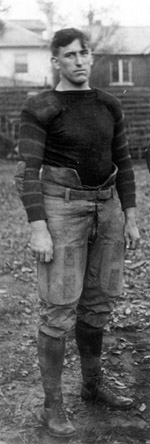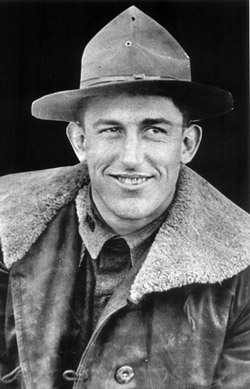Sept. 30, 2009
 Commodore History Corner Archive
Commodore History Corner Archive
The 2009 Vanderbilt football players will be representing the university’s 120th team. The program began in 1890 with a one-game schedule and a victory over the University of Nashville (Peabody), 40-0.
In that century and 20 years, five former Commodores have been selected to the National College Football Hall of Fame. One of these honored was Josh Cody.
Cody was born in nearby Franklin, Tenn., and attended Battle Ground Academy. In his first year at Vanderbilt (freshmen were eligible), Cody dropkicked a 45-yard field goal against Michigan in just his second game. Playing from his tackle position, he dropped back into the backfield and tossed a 12-yard touchdown pass to Rabbit Curry against Virginia that same year.
Cody played on the 1914 (2-6), 1915 (9-1), and 1916 (7-1-1) Commodores teams, but went on to serve in the army for two years as a lieutenant during World War I. He returned to Vanderbilt in 1919 (5-1-2) to finish his final year of eligibility. The six-foot-two, 230-pounder played both ways as a tackle that was dominating on defense and a fierce blocker on offense.
As a multi-sport player, Cody participated in basketball, baseball and track earning 13 letters. He was an All-Southern performer the last three seasons he played. Cody was also selected as an All-American in 1915, 1916 and 1919. The Southeastern Conference was organized in 1932.
Former legendary Nashville Banner sports writer and Vanderbilt alumnus (Class of 1927) Fred Russell once said about Cody: “When I think of Josh in his college days, I get a mental picture of this great big fellow playing catcher in the spring and between innings running out beyond the outfield to throw the shot or the discuss in his baseball uniform. He was unbelievably skillful and nimble for a big man in basketball, and in football where he’s a legend.”
A teammate of Cody in 1919, Ralph McGill, became the publisher of the Atlanta Constitution and said about Cody: “He was a great big fellow and one of the most seriously dedicated fellows I’ve ever met. He was a farm boy and he didn’t have any polish but he was very honest and sincere. He didn’t have scholarshipâ€â€Âwe had none in those daysâ€â€Âbut he had a real job. He literally cleaned the gymnasium every day, cleaned up the locker rooms and the showers, and tended to the coal furnace after practice.
“He was a big man, squarely built, quiet, almost shy, and enormously decent. He practiced long hours to place kick and became the team’s place kicker. He wasn’t fast, but he was fast for a big man. He didn’t like to wear pads. He got a hold of an old quilt and sewed it to the shoulders of the jersey and that was all the padding he wore.”
Cody began a coaching career at Mercer University in 1920 as coach of all sports and athletic director. He returned to Vanderbilt in 1923 to serve as head basketball, baseball and assistant football coach under his former mentor Dan McGugin. On the hardwood, Cody’s Commodore was 47-50 in four seasons. His 20-4 mark won the 1927 Southern Conference championship.
Cody left Vanderbilt in 1927 to become the head football and basketball coach at Clemson University. It was Cody who gave Red Sanders, a recent Vanderbilt graduate and future Vanderbilt head football coach, his first coaching job as an assistant at Clemson in 1927. In his first year as head football coach at Clemson, he led the Tigers to a 5-3-1 record and back-to-back 8-3 seasons in 1928 and 1929.
The Vanderbilt alumnus was very popular with the students and administration at Clemson. He was 4-0 coaching against rival South Carolina. Due to his success, rumors were circulating that Cody would be leaving for a better head coaching position. Showing their gratitude the university presented Cody with a new black Buick in May 1929. In his final season at Clemson (1930) the Tigers were 8-2. On the basketball court his Tigers’ record was 48-55 in four seasons.
Back to Vanderbilt was Cody’s next stop in his coaching career in 1931. He became McGugin’s chief assistant and head basketball coach. In his second stint as the Commodores basketball coach, Cody was 51-50. McGugin retired as Vanderbilt’s football coach at the end of the 1934 season and was replaced by former Vanderbilt quarterback (1908-11) Ray Morrison. Morrison had been SMU’s head football for 13 seasons compiling a 84-44-22 record.
Tennessean sports writer Raymond Johnson wrote after Cody’s death in 1961: “Josh Cody wanted to be Vanderbilt’s football coach so bad that he gave up the head man’s job at Clemson College after four successful seasons to return to his alma mater. That was in 1931 when he came back here as Dan McGugin’s first lieutenant. Long ago the cherished thought faded.
“Cody’s Clemson teams of 1928-29-30 had won 24 games and lost eight when he happily jumped at the opportunity to return to his alma mater. The head coaching job would be Cody’s when Dan stepped down At least McGugin would recommend him and he did when alumni pressure forced Dan to retire in 1934 after 30 years, during which time he put Vanderbilt on the football map.
“A group of old grads opposed Cody. Some claimed it was because he had McGugin’s approval. Ray Morrison got the job because the alumni wanted a name.”
Morrison did not utilize Cody’s abilities preferring his own coaches from SMU. There was a breach between the two men and McGugin did help Cody secure another coaching job. McGugin convinced Florida to hire Cody when their head coaching position became open.
Cody would leave the Vanderbilt campus again in 1936 to become the athletics director and head football coach at the University of Florida. While at Florida, Cody was 4-6, 4-7, 4-6-1 and 5-5-1 for a coaching total of 17-24-2.
In 1940, Cody was on the move again this time as the line coach at Temple under now-head football coach Ray Morrison. The animosity between the two disappeared when Morrison was relived of his Commodore coaching assignment after the 1939 season and record of 29-22-2. Morrison was Temple’s head coach from 1940-48. Cody was appointed head basketball coach in 1942 (thru 1952) and held this position until he was named Temple’s athletics director in 1952.
 When the Temple football coach suddenly resigned, Cody went back to the sidelines in 1955 for an encore as his replacement. That team was a dismal 0-8 in his final season as a coach. In his tenure as the Temple’s basketball coach, Cody was 124-103 and in 1944 took the Owls to their first NCAA National Tournament appearance reaching the Elite Eight.
When the Temple football coach suddenly resigned, Cody went back to the sidelines in 1955 for an encore as his replacement. That team was a dismal 0-8 in his final season as a coach. In his tenure as the Temple’s basketball coach, Cody was 124-103 and in 1944 took the Owls to their first NCAA National Tournament appearance reaching the Elite Eight.
Temple had black players on their basketball teams and before their appearance in the 1957 NCAA Tournament in Charlotte segregation was a concern. When asked about the possibility of Temple’s team not being allowed in restaurants or hotels Cody, as AD, responded, “If our team can’t go together, we won’t go.” They stayed together.
Tommy Henderson was a Vanderbilt quarterback and basketball player at Vanderbilt from 1930-32. In tribute Henderson said after learning of Cody’s death: “Josh was one of my closet friends until he went to Temple. After that I’m afraid we lost contact He had a lasting influence on the men who played for him He was kind and considerate but demanding too. He was a fine defensive basketball coach who believed in aggressive defensive fundamentals. In football he was respected for what he knew and what he could do with his material.”
In 1959, Cody retired to his 190-acre farm across the Delaware River in Moorestown, N.J. He died on his farm in 1961 at age 69. Cody was enshrined into the National College Hall of Fame in 1970 and the Tennessee Sports Hall of Fame in 1999. He is Vanderbilt’s only three-time (1915, 1916, 1919) All-American football player.
Fred Russell tells one well-known story about Cody in a chicken-eating contest from his days at Clemson: “When he was at Clemson he had a contest with Herman Stegeman, the coach at Georgia. Josh weighed about 260 then. He out stripped Stegeman by 11 chickens. He wasn’t satisfied just to win. He just went on to a decisive victory.
Said Cody on the eating contest, “I got two chickens ahead of him early and just coasted.”
Traughber’s Tidbit: There have been five former Vanderbilt football players to be inducted into the National College Football Hall of Fame. These include: John J. Tigert, fullback (1901-03); Josh Cody, tackle (1914-16, 1919); Lynn Bomar, end (1922-24); William Spears, quarterback (1925-27) and Carl Hinkle, center (1935-37).
Tidbit Two: There have been three former Vanderbilt football coaches inducted into the National College Football Hall of Fame. These include: Dan McGugin (1904-17, 1919-34); Ray Morrison (1918, 1935-39) and Red Sanders (1940-42, 1946-48). Morrison and Sanders also coached at other universities.
Tidbit Three: During the first 10 games that Vanderbilt and Ole Miss played football beginning in1894, the Commodores won all 10 and the Rebels failed to score a single point. The Rebs lost 9-2 to Vanderbilt in 1910 then lost the next five games without scoring a point. Vanderbilt won the first 19 games by a margin of 566-16. Ole Miss won its first game against Vanderbilt in 1938, 13-7. Mississippi leads the all-time series 46-35-2.


